- Home
- Michael Leese
(Jonathan Roper Investigates Boxset
(Jonathan Roper Investigates Boxset Read online
Jonathan Roper Investigates
A boxset of gripping murder thrillers set in modern-day London
A note from the author.
Welcome to my unputdownable series of standalone stories featuring Jonathan Roper and Brian Hooley. The pair are Scotland Yard’s secret weapon in the fight against crime and terror - but they couldn’t be more different. Roper is young, gifted and autistic, and his idea of social interaction is telling people what they’ve got wrong. Hooley is the veteran copper who has seen and done it all. His idea of social interaction involves a punch in the mouth followed by a pint. It’s a potent mix and offers a roller coaster ride that will leave you gasping for breath or laughing out loud.
This book is written in British English.
I’d like to invite you to visit www.michael-leese.com to sign-up for my VIP readers list, to hear about new releases, free book promotions, special offers and exclusive extras.
As a Brit I’d recommend you settle down with a nice cup of tea and enjoy what is far more than just another cop story. You may have your own ideas on the perfect liquid accompaniment…
Going Underground
Michael Leese
© Michael Leese
Beckenham, Kent.
David Evans looked at the familiar face of his Personal Assistant, Sylvia Jones. It was the weekend and technically her day off, but he wasn’t surprised she had come to work. He returned her smile, thinking again how lucky he was to have her.
“Sorry to interrupt you Mr. Evans,” she said. It would always be Mr. Evans, despite his gentle efforts to get her to call him David. They’d been together for more than twenty-five years. He was certain that if she ever left then part of his business would depart with her. He was a solicitor who had done well from the property boom.
He glanced down at his tie. He always wore a shirt and tie, even at the weekend. His wife teased him for being stuffy, but she liked the way it demonstrated a commitment to doing things in the traditional way. Today she had picked out a light blue shirt with blue-striped tie. She thought the combination suited his ruddy complexion, pale blue eyes and grey hair. Evans realised he had allowed his mind to wander, leaving his PA waiting for a reply.
“I said would you like a cup of tea?” she repeated. She wasn’t irritated by his failure to speak. She knew he was possessed of an imagination that snatched him away from the real world. Like her boss she always made an effort to dress properly, as she liked to think of it. Today she was wearing her standard office outfit of a black skirt, loose fitting white blouse, which she used to try and disguise an ample bosom, dark stockings and dark loafer-style shoes that were solid and comfortable. Balanced on the tip of her nose were her new tortoiseshell glasses purchased after grudgingly accepting that she could no longer see her computer screen. Evans thought they suited her, but kept that to himself as he knew she hated them. Her make-up was minimal and her hair looked as though she had just come from the salon, which she had. She always had her hair done first thing on a Saturday.
Evans ran his hand through his own hair. It was a habit his wife said had got worse since it started falling out. She claimed he was constantly checking he still had some. He didn’t know about that, but was happy to admit that he would love it if he could return to the thick brown mop he had taken for granted in his younger days.
He switched from thoughts of youth to the needs of today as he replied. “Tea would be delightful, but you really don’t need to be here you know. How is your mum by the way?”
She seemed to shrink into herself for a moment - or was that his imagination? “She’s been better for the last few days. It seems to go up and down. But she’s well enough for me to leave her with one of our neighbours, at least for a couple of hours. It gives me the chance to get out of the house. It can get a bit claustrophobic. Anyway, I can always be back in 10 minutes.”
He thought ‘claustrophobic’ was something of an understatement but knew better than to push the point. “You know best, of course, and I do understand how you can sometimes need a break from family life.”
She backed out and he returned his attention to his computer. He was spending more time in the office at weekends so he could indulge in his hobby. He caught himself. This was his passion and it was increasingly dominating his thoughts. He’d always enjoyed his work as a solicitor. Over the years he had steadily built up his suburban practice. But it had all got a little predictable; so this provided the mental challenge he was looking for. He was at an age, sixty-two years, when he was considering retiring and this would more than adequately help him fill the time. He’d even started taking on the odd commission and had just completed an especially challenging task that had taken up many of his days off. Today he was reviewing his work. It was easy to make mistakes and he was a perfectionist.
Ten minutes later he was deep in his research again and this time he didn’t even look-up as he heard his PA backing through his door holding a tray in her hands. The room could have come straight from a museum about 1950’s England. Polished brown furniture dominated and he sat at an elegant high-backed Captain’s Chair, finished with green leather, in front of a large desk. On the client’s side were two comfortable chairs that were almost old enough to be classified as antiques. The carpet, an ancient Axminster that had probably done 30 years’ service, was a light-brown with a thin green thread woven in for contrast. Against one wall was a row of gun-metal cabinets and on the wall above them was a picture of the Queen taken on her Silver Jubilee. It was only lacking a Bakelite radio tuned to the Home Service. The nod to the present day was his flat-screen monitor, printer, shredder and mobile phone. An iPhone, because his children had told him it was the best.
Jones turned carefully as she made it through the door then crossed to the desk where she placed her tray on the dark green leather top. She’d done this, hundreds, maybe thousands, of times before. The tray held tea made just the way he liked it; loose-leaf English Breakfast in a Brown Betty pot that had been carefully warmed before the tea leaves were covered in freshly boiled water; the brew left to stand for four minutes. Jones placed a strainer over the white, bone-china cup, with matching saucer, and poured out his drink; the milk went in afterwards, not before. She leaned across the desk to place the cup within easy reach of his right hand. On other days, there might have been a plate of biscuits but Evans had promised his wife that he would lose a few pounds.
So far, she had followed the routine exactly. Now she did something different. She lifted a white cloth to reveal a Smith & Wesson M66 Combat Magnum. It was loaded with .38 Special rounds, rather than the more normal .357 Magnum cartridges. It had been explained that this was probably one of the most straightforward guns to handle. It was said to combine effective stopping-power with simplicity of use. The choice of ammo was also supposed to help. Slightly less recoil. Marginal gains. She was told this was the way to go for the first-timer. The one thing they kept repeating was: just one shot, that’s all you’ll get. Don’t expect to get a second. When it came to the real thing she would start to panic; everyone did. This would throw off her aim; making it unlikely she would hit the target twice. Now she picked up the gun and started to take aim. At that moment, something alerted Evans. Maybe her ragged breathing. He turned to see his PA standing there with a gun.
Flight, fight or freeze; the basic responses to fear. Evans froze. He was so astounded he didn’t take in that she had adopted a text-book shooting position; knees lightly flexed; one foot placed slightly ahead of the other; taking her weight on the balls of her feet. But there were two things he couldn’t miss. The gun was pointing at him and he could see her finger starting to exert pressure on the trigger.
London’s traffic could be unbearable, even if you were experiencing it from the luxurious back seat of a Rolls-Royce Phantom. When it was slow going like this, Sir James Taylor enjoyed a game of his own devising: watching cyclists present the finger as they weaved past. While they couldn’t see in through the rear privacy glass it was a reasonable assumption that a City fat-cat might be lurking inside. To win the game he had to guess how many fingers he would see on any given trip. Get it right and he would treat himself to a glass of champagne at home. Guess wrong and he would donate £500 to charity. So far, the champagne remained unopened and the cost was mounting. He didn’t mind. If you could afford a car like this, it was the Mark 11 version and worth north of £400,000 with a few customised finishes; you could afford to pay your debts.
But in the last half-an-hour the car had managed to move forward about three feet and he had already lost. Not even the soothing tones of Vivaldi floating out of the hand-built stereo system could ease his mounting impatience as he stared at an unchanging view of Fleet Street from the Ludgate Hill end.
“Traffic seems particularly bad tonight, Adam,” he said to his driver.
“Yes Sir,” he replied, nodding at the Sat Nav screen. “This is telling me there’s been a student demonstration in Westminster. They’ve managed to grid-lock the area so it’s causing problems all over central London.”
Sir James snorted. “What are they moaning about now? Someone asked them to hand in the annual essay?”
The driver’s shoulders shook slightly as he suppressed a laugh. He always tried to remain the cool professional when he was working, but Sir James had a wickedly sly sense of humour. He glanced in his rear-view mirror and saw his boss undoing his seatbelt.
“Getting out Sir?”
“Yes. I can’t stand any more of this. I need a bit of exercise so might as well walk home from here. It’s a decent trot to Eaton Square and might help me shed a few pounds.”
The driver thought that if Sir James lost any more weight he’d be positively skinny, but kept that idea to himself.
“You might as well call it a day. I won’t need you again until tomorrow morning at the usual time.”
With that he opened the door and stepped out to the pavement. There was a burst of sound from the street; pedestrians talking, laughing and cursing at the cyclists and vehicles. The noise was accompanied by the thick hot smell of engine fumes generated by so many idling engines. Then the tumult was shut out as the door closed with an almost imperceptible clunk. From his incredibly comfortable seat behind the wheel the driver watched his boss walk past the Punch Tavern and then disappear into the crowds near a sign pointing to St Bride’s Church. He left it a few minutes to make sure he wasn’t going to change his mind and then pulled off his peaked cap. With a bit of luck someone might even think the car belonged to him. Now all he had to do was work out how he was going to get out of this traffic jam and back to the secure underground car park at Canary Wharf, where his own Nissan Micra was currently occupying a small corner of the Rolls’ parking place.
Chapter 2
The thick file thumped down on his desk, making Chief Inspector Brian Hooley jump. Once again his boss, Deputy Assistant Commissioner Julie Mayweather, had surprised him.
“As light on your feet as ever, Ma’am,” he said.
A hint of a smile touched her brown eyes but her expression was dead-pan.
“Sir James Taylor,” she said, nodding at the file.
He felt a sudden spike of interest. He gestured at the pile of documents. “The billionaire that’s been missing for a few weeks now?”
“Six, actually, and not anymore; he’s been found, or some of him has.”
Responding to her deputy’s raised eyebrow she added. “They found a torso a couple of weeks back. The head, hands and feet had been cut off. Made it bloody difficult to ID him, but they managed yesterday.
“Everything you need to know is in there, come and see me once you’ve gone through it.”
With that she turned on her heel and left his office as silently as she had entered, her size six feet seeming to glide over the carpeting. Hooley turned to his left to close the document he’d been studying on his computer. Then he started on the material in front of him. He was pleased it was a physical copy, being of an age where paper won over screen every single time.
An hour later and he had a clear picture in his mind. Based on what he had just read Sir James was a man who gave capitalism a good name. He’d started out as a trader and then rapidly set up his own hedge fund, making billions for himself and his investors through specialising in what were described as ethical investments; the sort where some attempt was made to share profits around and not deal with despots. Five years ago, his wife had died after a short but brutal battle with breast cancer. He took two months off to mourn her death and then announced he was quitting the financial world. Instead he was going to use his fortune to help others.
He created a charity in his wife’s name, The Miriam Foundation, and set about giving his money away. Since he had so much, it was going to take a long time. Unsurprisingly breast cancer charities were among the early beneficiaries, but he also donated large sums to children’s causes. He and his wife had never been able to have their own, despite their dearest wish. He was especially generous to scientists and doctors involved in new techniques to aid conception. A year ago, his work was rewarded with a knighthood. It was an obvious high point, but also reminded him of how much he missed his wife and how proud she would have been to come to Buckingham Palace to see the Queen tap his shoulders with the sword.
Then six weeks ago he had vanished. He was last seen at a board meeting at the Foundation HQ in Canary Wharf. Those present said he had been in an ebullient mood, identifying some new recipients for donations and paying attention to various reports. The meeting had wrapped up shortly before 5pm. Sir James had declined a drink saying he was heading home and looking forward to eating a shepherd’s pie prepared by his house keeper, by all accounts an excellent cook. She had made it that morning and left it in the fridge for when he got home.
She was the one who had first raised the alarm. The following morning, she arrived for work at 7am as usual. Checking the fridge, she noted that the food was untouched. She went upstairs and realised he had not used the bed in the suite of rooms that made up his bedroom on the second floor. She looked outside to see that the driver was already there with the Rolls-Royce. He told her that he had assumed Sir James was inside as he had last seen him getting out of the car in Fleet Street the previous evening. He had taken to walking a lot since his wife died, partly because it kept him fit, but also because it helped fill in the time rather than being alone.
For the next few hours the woman had waited anxiously for news - Sir James was normally the most predictable of people - then decided to check with the Foundation. This sparked off a chain of phone calls, all of which revealed the same thing: no one could get hold of him. Just before 1pm an increasingly anxious PA had called the police. For the first couple of hours it had been treated as a routine missing person’s report, but over the next 48 hours it was rapidly bumped up in importance, eventually landing in the lap of a Superintendent John Williams. Hooley had worked with the man and knew he was a good officer; and so it proved. His team did everything by the book, including an appeal which generated press coverage around the world. It’s not every day that a billionaire goes missing.
But as the days went on the mystery deepened. The last person to see him alive was the driver, who found his world turned upside down as police examined every aspect of his life. An equally sharp light was turned on the housekeeper, his PA and the foundation board. This also revealed nothing. It was as though he had disappeared from the face of the earth. Every possibility was considered and given that he had got out of a car near the River Thames, CCTV footage covering Blackfriars Bridge was checked, and re-checked in case he had jumped. The river police were put on high ale
rt, but no body was found.
The only slight oddity which had emerged was that Sir James had created his own DNA profile. It was not something he had ever discussed with colleagues, but it was assumed he had done it because he could and might have been thinking about needing specialised treatment at some stage in the future. Whatever the reason, it was this that eventually led to the identification of his body.
Four weeks into the search, in an apparently unrelated incident, the torso of a man had been found in the cellar of a disused warehouse in East London. By then Supt. Williams had issued an instruction that any unidentified body should have its DNA taken and the details passed immediately to his squad. In this case there had been a slight delay because the mortuary where the body ended-up was understaffed and over-worked. But yesterday the news had come in that the partial remains were those of the missing billionaire.
As he finished reading Brian Hooley sighed and sat back in his chair. His eyes felt gritty and he rubbed at them to try and get some relief. A thirty-year veteran of the Met he knew when trouble was heading his way, and it was clear what this was going to be. He picked up one of the pictures that were included in the notes. Holding it in his right hand he was struck that even in a photograph Sir James radiated a powerful aura. He was clearly a man used to taking centre stage and he looked the part. His perfectly cut salt and pepper hair and silver rimmed glasses complimented his pink-cheeked complexion. He thought it highly likely that the suit Sir James was wearing cost more than he earned in a month. He carefully replaced the photo in the file and made his way to his boss’s office.
Chapter 3

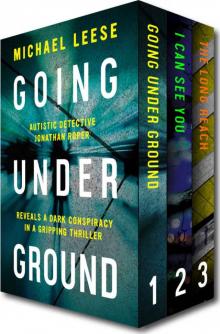 (Jonathan Roper Investigates Boxset
(Jonathan Roper Investigates Boxset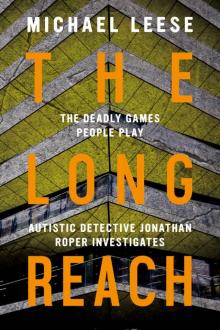 The Long Reach: British Detective (Jonathan Roper Investigates Book 3)
The Long Reach: British Detective (Jonathan Roper Investigates Book 3)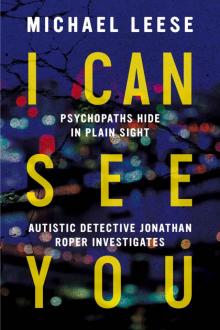 I Can See You
I Can See You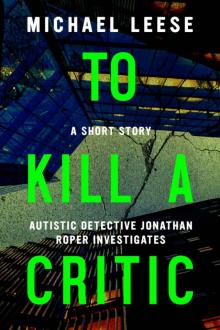 To Kill A Critic
To Kill A Critic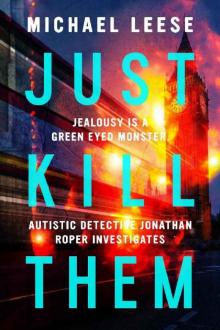 Just Kill Them
Just Kill Them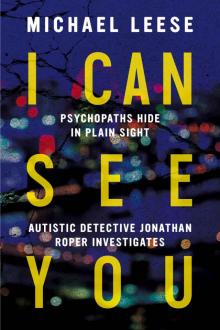 I Can See You: Autistic British Detective: Jonathan Roper Investigates Book 2
I Can See You: Autistic British Detective: Jonathan Roper Investigates Book 2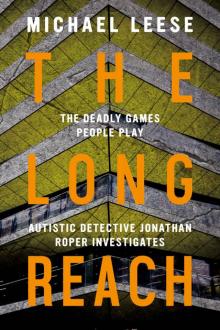 The Long Reach_British Detective
The Long Reach_British Detective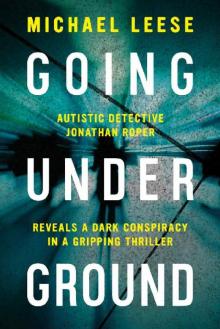 Going Underground (Jonathan Roper Investigates Book 1)
Going Underground (Jonathan Roper Investigates Book 1)